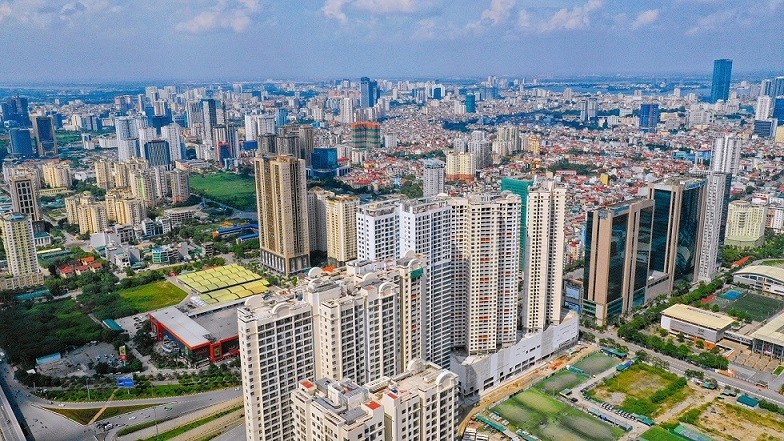
Global Minimum Tax: Vietnam needs to learn from Western and ASEAN experience
Latest
 |
| Applying the global minimum tax would bring Vietnam new opportunities, such as increasing the budget from additional tax and limiting the chance of tax evasion, tax avoidance, and transfer pricing. (Source: VOV) |
In the 15th National Assembly’s 6th session, many deputies agreed that it was necessary to issue a Resolution on the application of additional corporate income tax following regulations to prevent global tax base erosion (global minimum tax).
New opportunities open
The global minimum tax is an agreement reached by G7 countries in June 2021 to prevent multinational corporations from shifting profits to countries with low tax rates to avoid taxes, effective from January 1st, 2024.
The tax rate will be 15% for multinational enterprises with total consolidated revenue from 750 million euro (about 800 million USD) within 2 among 4 consecutive years.
UK, Japan, South Korea, European Union (EU) will impose the tax in 2024. Vietnam also plans to impose this tax at the same time.
Minister of Finance Ho Duc Phoc said that the global minimum tax is not an international treaty or commitment and is not mandatory for countries to apply. However, if Vietnam does not impose taxes, it means giving up the right to define tax and businesses will pay additional taxes to their home country - where their holding companies’ headquarters is located.
The imposition of this tax will bring Vietnam new opportunities, such as increasing budget revenue from additional tax revenue and limiting the phenomenon of tax evasion, tax avoidance, and transfer pricing.
The global minimum tax policy has been developed and proposed to be applied by the Vietnamese Government from the beginning of 2024, including regulations on combined Income Inclusion Rule (IRR) and Qualified Domestic Minimum Top-up Tax (QDMTT).
After a review by the General Department of Taxation (Ministry of Finance), there are about 122 foreign corporations investing in Vietnam that are affected by the global minimum tax. If countries with holding companies all imposed taxes from 2024, these countries will collect an additional tax difference of more than 14.600 billion VND in the following year.
When Vietnam applies IRR with the Vietnamese corporations investing abroad with a minimum consolidated revenue of 750 million Euro and the actual corporate income tax of member companies in other countries is lower than the minimum level (15 %), additional corporate income tax will be collected from these units.
On this regard, Mr. Vu Tuan Anh, Standing Member of the Finance and Budget Committee, said that collecting additional global minimum tax is necessary. If Vietnam does not collect this tax, other countries will also collect it, so there will be a tax loss of about 14.600 billion VND.
Mr. Vu Tuan Anh affirmed: "The nature of global minimum tax collection is that for foreign-invested enterprises in Vietnam that receive the preferential tax rate of 10%, they will have to pay additional taxes to match 15% following to regulations of the Organization for Economic Cooperation and Development (OECD). It means tax incentives for these businesses will be reduced compared to before.
Therefore, along with the global minimum tax mechanism, it is necessary to consider supportive policies so that foreign businesses can feel secure in investing. These policies have not yet been researched by the Government and submitted to the National Assembly".
 |
| Prof. Dr. Andreas Stoffers, Country Director of the Friedrich Naumann Foundation (FNF) in Vietnam. (Photo: Linh Chi) |
Toward a successful application of global minimum tax
Talking with the World and Vietnam Report, Prof. Dr. Andreas Stoffers, Country Director of the Friedrich Naumann Foundation (FNF) in Vietnam, said that in Germany, the global minimum tax is often viewed positively.
Prof. Dr. Andreas Stoffers emphasized that: “Europe's largest economy hopes that such a tax will help fight tax havens and tax avoidance by multinational corporations. Most German politicians support this project, as this tax could help multinational corporations pay their fair share of taxes and thus bring more money into the public treasury”.
On November 10, the German Federal Parliament officially passed the EU Decree bill on global minimum tax submitted by the Federal Government. The German federal government said the bill aims at implementing key points in international agreements in order to fight tax competition and actively set up tax plan, thereby contributing to promoting tax fairness and fair competition”.
In Vietnam, Prof. Dr. Andreas Stoffers noted that the Government has clearly seen the urgent need to act and has begun research on the global minimum tax rules. Vietnam's Association of Foreign Invested Enteprises (VAFIE) established a working group consisting of experts in various fields to consult with the Government.
This expert emphasized: "It is a fact that if Vietnam implements global income tax too slowly, it can lead to disadvantages for the country. Vietnam will not receive the tax difference 8% from more than 100 foreign direct investment (FDI) companies qualify for this tax, which is equivalent to several billion US dollars annually for Vietnam's national budget.
And, the investment environment in Vietnam will be affected because investors will shift their investment to other countries with benefit sharing mechanisms related to this new tax regulation".
To successfully implement global minimum tax, Professor. Dr. Andreas Stoffers commented that Vietnam needs to exchange ideas and lessons of success with other countries. It is also necessary to learn from the approaches and experiences of Western industrialized countries as well as of other emerging economies in the ASEAN region.
Dr. Andreas Stoffer affirmed: "Global minimum tax brings both huge challenge and new opportunities for Vietnam. Tax evasion and transfer pricing were tough problems in the past. Now, these things must be addressed in the context of discussion on the legal implementation of the mechanisms for this global tax.
Vietnam is still an attractive destination that brings many advantages to investors. Besides this tax-related tax reform, other issues of the country also need to be strongly addressed, including compliance issues, infrastructure, administrative procedures, labor productivity, education and skills.
In my opinion, Vietnam needs to catch this important opportunity to consider the use of tax incentives and improve its investment policy framework, in order to maintain its position as an attractive long-term destination, especially for multinational businesses".
























